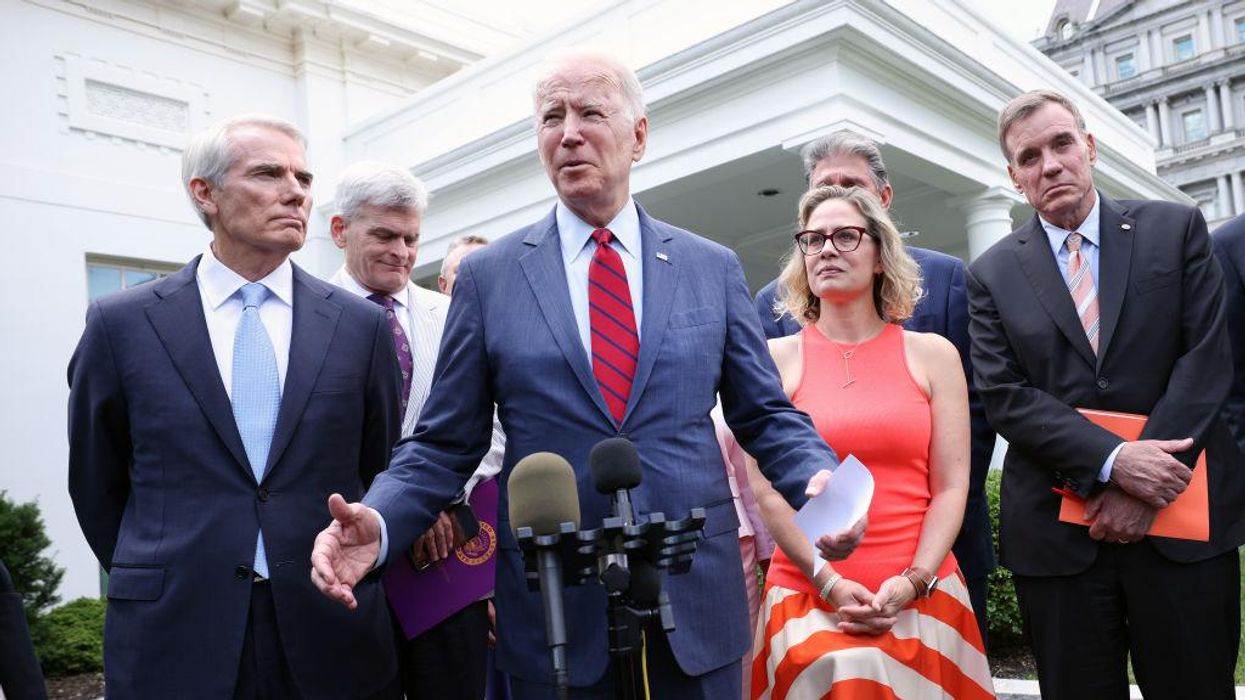
Kevin Dietsch/Getty Images

President Joe Biden announced Thursday that Republican and Democratic negotiators have come to a deal on an infrastructure package, telling reporters that both sides made "serious compromises" before coming to an agreement.
"We have a deal," the president declared after a briefing with lawmakers on a bipartisan $1.2 trillion plan endorsed by 21 senators in both parties.
We\u2019ve struck a deal. A group of senators \u2013 five Democrats and five Republicans \u2013 has come together and forged an infrastructure agreement that will create millions of American jobs.— President Biden (@President Biden) 1624552944
Negotiations on the plan were led by Sens. Kyrsten Sinema (D-Ariz.) and Rob Portman (R-Ohio), who agreed to more than $550 billion in new spending on so-called "hard infrastructure" — roads, bridges, and other projects traditionally associated with the idea of infrastructure improvements. Other "human infrastructure" provisions of Biden's original $4 trillion plan including components of the Green New Deal, free community college tuition, child care, and a national paid leave program would be relegated to a second bill.
"We made serious compromises on both ends. ... Republicans and this group did not want to go along with many of my family plan issues, the child care tax credits, the human infrastructure that I talk about," President Biden said.
"We'll see what happens in the reconciliation bill and the budget process, if we get some compromise there," he added. "And if we can't, see if I can attract all the Democrats to a position. But they're going to move on a dual track."
\u201cWe have a deal.\u201d\n\nPresident Biden announced a bipartisan infrastructure agreement after meeting with Democratic and GOP senators at the White House.pic.twitter.com/GNGN47wZA7— The Washington Post (@The Washington Post) 1624554534
According to a fact sheet published by the White House, the bipartisan agreement would spend $312 billion on transportation, including $109 billion for roads, bridges, and major projects, $49 billion for public transportation, and $66 billion for passenger and freight rail. Billions of dollars would also be spent on safety, airports, ports and waterways, electric buses and transit, and electric vehicle infrastructure like charging stations.
The legislation also would spend $65 billion for broadband internet, $55 billion for water infrastructure, $73 billion for power infrastructure, and $47 billion for resilience to the effects of climate change.
A sticking point for Republican negotiators was funding for the plan. President Biden wanted to increase corporate taxes to pay for the package while GOP senators staunchly refused to revisit the tax reform bill signed into law by President Donald Trump. Biden in turn rejected GOP proposals to raise the gas tax or enact fees for electric vehicles.
The compromise will be partially paid for by redirecting unspent funds from the most recent coronavirus stimulus bill and the unemployment insurance relief funds, which Biden had initially opposed. Other funding mechanisms include allowing states to sell or purchase unused toll credits, extending expiring customs user fees, 5G auctions proceedings, the strategic petroleum reserve sale, and public-private partnerships, the White House said.
"This is roads and bridges but also lots of other kind of infrastructure, including broad system and the water system and rail system. It's all good for the economy. More efficiency in the economy, more economic growth," said Sen. Portman after Biden finished speaking.
While Biden's endorsement of the plan is significant, it is not a guarantee that the bill will pass. Senate Majority Leader Chuck Schumer (D-N.Y.) has promised to bring up the bipartisan bill when the Senate goes into session in July, but he's emphasized that it will be "tied together" with a second package that includes progressive priorities no Republican will support.
Democrats will attempt to pass the second infrastructure bill using budget reconciliation to circumvent a filibuster attempt by Republicans and pass the bill without GOP support. This is an attempt to appease progressives like Sen. Bernie Sanders (I-Vt.) and Elizabeth Warren (D-Mass.), who say the compromise bill is too small and won't vote for it without guarantees that their priorities will pass too.
House Speaker Nancy Pelosi (D-Calif.) has likewise made clear that the bipartisan compromise is dead unless the Senate passes the reconciliation bill.
"There ain't no infrastructure bill without the reconciliation bill," she reportedly told Democrats Thursday.
Schumer is conscious of the pressure progressives are exerting on the Senate.
"All parties understand, we won't get enough votes to pass either unless we have enough votes to pass both," Schumer said on the Senate floor Thursday.
However, the infrastructure deal falls apart if Democrats cannot get every member of their conference to support the reconciliation package. That means moderates like Sinema or Sen. Joe Manchin (D-W.Va.) will be threatened with the failure of the bipartisan compromise if they don't vote for the more extreme bill.
That threat goes both ways, of course. If Manchin or another moderate tells the progressives he won't support the reconciliation bill unless the bipartisan compromise is passed first, neither bill will advance.
Manchin has not committed to supporting the reconciliation bill, which would cost $6 trillion, telling reporters he needs to see what's in it before he makes his decision.
"I know what's in this plan, and we have the responsibility and obligation to make sure that all the Congress on both sides know what's in this plan. To say that one's being held hostage, that doesn't seem to be fair to me," Manchin said.
Then there are the Republicans. Senate Minority Leader Mitch McConnell (R-Ky.) has not yet made up his mind about the compromise bill. Ten Republican votes are needed to overcome a filibuster attempt by any member of the Senate and while Biden may have a deal, it is unclear if he currently has that support.